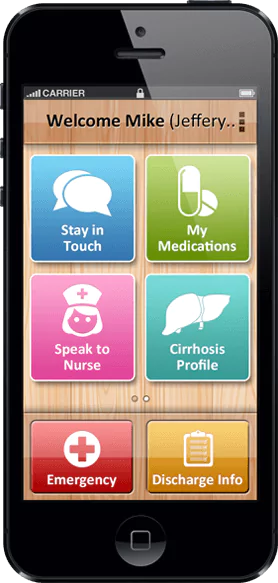Patient Buddy application helps reduce readmissions for hepatic encephalopathy
 Patients with cirrhosis can avoid readmissions for hepatic encephalopathy by using a new mobile app that helps them manage their condition, a new study has found. The Patient Buddy, developed by Creative Information Technology, Inc., seeks to reduce the number of avoidable readmissions by streamlining communication among physicians, case managers and patients after the patients are discharged from hospitals. “The app was able to reduce hepatic encephalopathy–related readmissions and was educational to patients and caregivers,” said study author Jasmohan S. Bajaj, MBBS, MD, MSc, associate professor of medicine at Virginia Commonwealth University, in Richmond. He presented the data at the 2017 International Liver Congress (abstract FRI-024). Remote patient monitoring via mobile apps has not been well studied because the technology is still relatively new. But interest among clinicians is high, said Jeffrey A. Kahn, MD, associate professor of clinical medicine at the University of Southern California’s Keck School of Medicine, in Los Angeles, who was not involved in the study. “I think apps have the potential to be very useful, and the idea of using an app for various aspects of patient care, especially patients with liver disease, is very helpful.”
Patients with cirrhosis can avoid readmissions for hepatic encephalopathy by using a new mobile app that helps them manage their condition, a new study has found. The Patient Buddy, developed by Creative Information Technology, Inc., seeks to reduce the number of avoidable readmissions by streamlining communication among physicians, case managers and patients after the patients are discharged from hospitals. “The app was able to reduce hepatic encephalopathy–related readmissions and was educational to patients and caregivers,” said study author Jasmohan S. Bajaj, MBBS, MD, MSc, associate professor of medicine at Virginia Commonwealth University, in Richmond. He presented the data at the 2017 International Liver Congress (abstract FRI-024). Remote patient monitoring via mobile apps has not been well studied because the technology is still relatively new. But interest among clinicians is high, said Jeffrey A. Kahn, MD, associate professor of clinical medicine at the University of Southern California’s Keck School of Medicine, in Los Angeles, who was not involved in the study. “I think apps have the potential to be very useful, and the idea of using an app for various aspects of patient care, especially patients with liver disease, is very helpful.”
In the trial, the researchers gave smartphones with the Patient Buddy app adapted for cirrhosis with three areas of study—hepatic encephalopathy, ascites and falls—to 40 patients with cirrhosis and their caregivers. The app can be customized for a variety of conditions, but was “designed to address the significant problem of hospital readmissions” and facilitate communication between patients and physicians, according to a company press release. The recipients were trained to use the app, which included orientation questions and capability to monitor weight, sodium levels and adherence to medication. Researchers followed up with the pairs by phone after the first and third weeks, and in person after the second and fourth weeks. At the conclusion of the study, the team tallied the number of readmissions and examined the reasons for them. Four pairs of patients and caregivers dropped out within one week, citing the app’s complexity. Fifteen patients had been readmitted: five for infections; three for anasarca; two for gastrointestinal bleeding; two for chest pain; and one each for anemia, opioid overdose and jaundice after the insertion of a transjugular intrahepatic portosystemic shunt. Richard K. Sterling, MD, a hepatologist at Virginia Commonwealth University, evaluated the readmissions and determined that three of them (7.5% of the original cohort) could have been avoided. Eight patients developed hepatic encephalopathy, but the cases were managed successfully through the Patient Buddy app, medication changes and outpatient checkups. None was readmitted for that reason. The researchers then compared the results with a historical cohort of 73 cirrhotic patients with similar disease severity. Within 30 days of discharge, 34 patients had been readmitted: 17 for hepatic encephalopathy, seven for ascites, five for infection, three for GI bleeding and two for other causes. Eighteen readmissions, or 24% of the original cohort, were considered avoidable, according to the researchers. “While the total was similar, avoidable and hepatic encephalopathy–related readmissions were significantly lower in the Patient Buddy cohort,” the authors reported. The retrospective study design leaves room for debate about whether the app is the deciding factor, said Benjamin Philosophe, MD, PhD, surgical director of the Johns Hopkins Comprehensive Transplant Center, in Baltimore, who was not involved in the research. “They didn’t treat the patients after discharge the same way, with or without the app. The patients that were discharged with the app had two phone calls and two visits, whereas the historical control had no regimen like that. So how much of this is the app versus how much of this is just close follow-up with the phone calls and visits?” He added that more research, including prospective studies, is needed to gauge the effectiveness of the approach. “I think the positive thing that came out of this study is not that the app made a difference, but that the study exemplifies that close follow-up and good communication between the patients and their care providers, once discharged, makes a difference,” Dr. Philosophe said.
—Kat Long